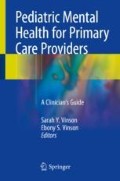Abstract
Pediatric primary care providers are well positioned to manage trauma in the primary care setting. The trusting, longitudinal relationships providers have with children and their families make them the ideal provider to screen, assess, and intervene. Educating, establishing safety for the child and family, providing techniques to manage difficult behaviors, educating the school, and coordinating further care for the family and child can profoundly help children and their families access appropriate and timely interventions. Childhood trauma, intimate partner violence, neglect, sexual abuse, or household dysfunction impact youth across all ethnic groups, gender identity, socioeconomic status, and ages. Families, communities, and society are all enriched if trauma can be prevented or treated before symptoms have lifelong consequences.
Access this chapter
Tax calculation will be finalised at checkout
Purchases are for personal use only
References
U.S. Department of Health & Human Services, Administration for Children and Families, Administration on Children, Youth and Families, Children’s Bureau. Child Maltreatment 2015. cited 2017 Dec 10. Available from https://www.acf.hhs.gov/cb/resource/child-maltreatment-2016. Accessed 28 May 2018.
Crusto CA, Whitson ML, Walling SN, Feinn R, Friedman SR, Reynolds J, Amer M, Kaufman JS. Posttraumatic stress among young urban children exposed to family violence and other potentially traumatic events. J Trauma Stress. 2010;23(6):716–24.
Felitti VJ, Anda RF, Nordenberg D, Williamson DF, Spitz AM, Edwards V, Koss MP, Marks JS. Relationship of childhood abuse and household dysfunction to many of the leading causes of death in adults: the adverse childhood experiences (ACE) study. Am J Prev Med. 1998;14(4):245–58.
Shonkoff JP, Garner AS, Siegel BS, Dobbins MI, Earls MF, McGuinn L, Pascoe J, Wood L. Early childhood adversity, toxic stress, and the role of the Pediatrician: translating developmental science into lifelong health. Pediatrics. 2012;129(1):224–31.
Kessler RC. Posttraumatic stress disorder: the burden to the individual and to society. J Clin Psychiatry. 2000;61(suppl 5):4–12.
American Psychological Association. Trauma. Available at http://www.apa.org/topics/trauma/. Accessed 10 Dec 2017.
Child Welfare Committee, National Child Traumatic Stress Network. Child welfare trauma training toolkit: Comprehensive guide (2nd ed.). 2008. Accessed 10 Dec 2017. Available from http://www.nctsn.org/nctsn_assets/pdfs/CWT3_CompGuide.pdf.
American Psychiatric Association. Diagnostic and statistical manual of mental disorders. 5th ed. Washington, DC: American Psychiatric Association; 2013.
Gerson R, Rappaport N. Traumatic stress and Posttraumatic stress disorder in youth: recent research findings on clinical impact, assessment, and treatment. J Adolesc Health. 2013;52(2):137–43.
Cohen JA, Kelleher KJ, Mannarino AP. Identifying, treating, and referring traumatized children: the role of Pediatric providers. Arch Pediatr Adolesc Med. 2008;162(5):447–52.
Arnsten AFT, Rasking MA, Taylor FB, Connor DF. The effects of stress exposure on prefrontal cortex: translating basic research into successful treatments for post-traumatic stress disorder. Neurobiol Stress. 2015;1:89–99.
Author information
Authors and Affiliations
Corresponding author
Editor information
Editors and Affiliations
Rights and permissions
Copyright information
© 2018 Springer International Publishing AG, part of Springer Nature
About this chapter
Cite this chapter
Durham, M.P. (2018). Trauma. In: Vinson, S., Vinson, E. (eds) Pediatric Mental Health for Primary Care Providers. Springer, Cham. https://doi.org/10.1007/978-3-319-90350-7_3
Download citation
DOI: https://doi.org/10.1007/978-3-319-90350-7_3
Published:
Publisher Name: Springer, Cham
Print ISBN: 978-3-319-90349-1
Online ISBN: 978-3-319-90350-7
eBook Packages: MedicineMedicine (R0)

